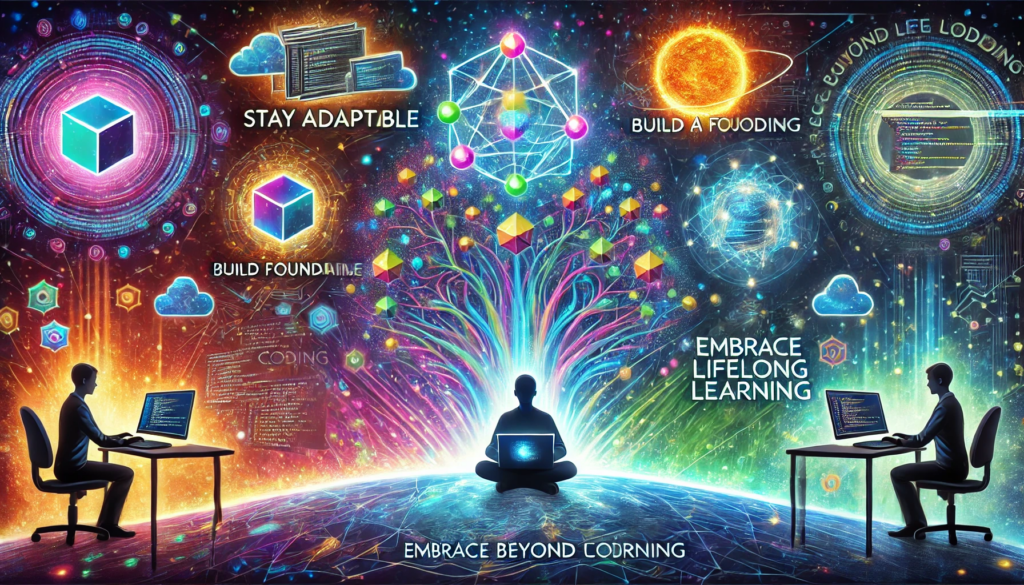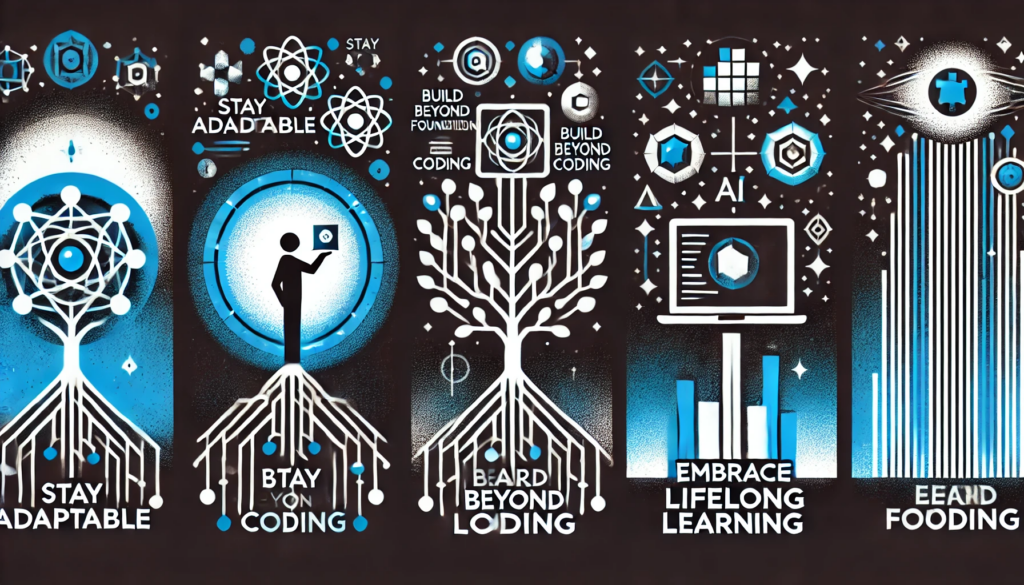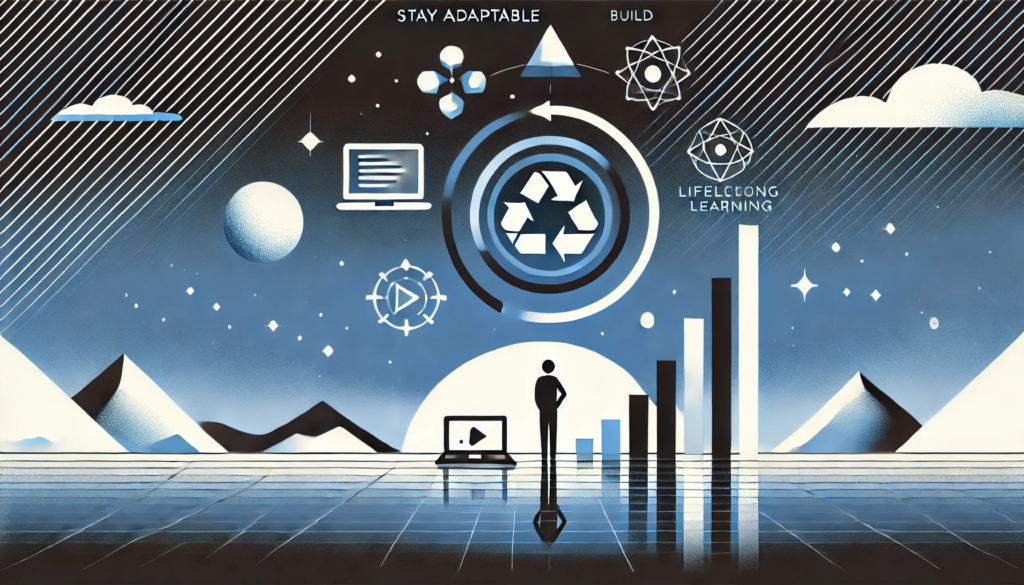
ChatGPT:
Should You Still Learn to Code in an A.I. World?
🌟 The Golden Age of Coding Boot Camps
Coding boot camps emerged in the mid-2010s as a transformative way to fast-track individuals into lucrative tech careers. Nonprofits, universities, and organizations championed these programs as a gateway for diverse populations to break into the tech industry. By 2020, these boot camps boasted impressive outcomes: 79% of graduates landed jobs, often earning a 56% salary increase.
For individuals like Florencio Rendon, a veteran seeking stability, coding boot camps offered a beacon of hope. After being laid off from multiple construction jobs, he turned to Fullstack Academy, graduating in 2023. However, he quickly discovered that his newly acquired skills were not enough to secure a job, reflecting a larger trend of declining success for boot camp graduates.
🛠 A.I. Disrupts the Equation
The tech landscape has changed dramatically with the rise of artificial intelligence tools like ChatGPT, GitHub Copilot, and Google’s AlphaCode. These tools can generate code, optimize existing solutions, and even debug, making basic coding tasks far easier and faster. In fact, 60% of developers surveyed by StackOverflow in 2023 reported using A.I. coding tools.
This rapid adoption of automation has reshaped the demand for coding skills, especially at the entry level. Employers increasingly require junior developers to offer more than basic coding abilities. They must demonstrate a broader understanding of systems, problem-solving skills, and business acumen.
📉 The Shrinking Job Market
The job market for entry-level software developers is at its weakest in decades. Job postings for developers have fallen by 56% overall, with a staggering 67% drop in opportunities for inexperienced coders. This contraction has hit coding boot camp graduates particularly hard.
Organizations like Launch Academy and Launchcode, once celebrated for their high placement rates, are now facing significantly reduced hiring metrics. In some cases, placement rates have dropped below 60%, prompting programs to pause or reconsider their offerings.
🧠 Beyond Coding: The Skills That Matter
While coding remains valuable, employers are increasingly seeking professionals with interdisciplinary skills. Entry-level developers now need to understand how their code integrates into broader systems and contributes to business outcomes.
Experts suggest that aspiring coders focus on a mix of technical and soft skills:
• Problem-Solving: Ability to tackle complex challenges beyond coding syntax.
• System Thinking: Understanding the interconnectedness of software components.
• Business Acumen: Strategizing solutions that align with organizational goals.
• Communication: Clear articulation of ideas and collaboration with teams.
🚀 The Rise of A.I. Skills
As A.I. tools become mainstream, new roles such as “machine learning engineer” and “A.I. engineer” are emerging. These positions require advanced expertise, including deploying machine-learning models, automating workflows, and monitoring systems.
However, these roles often necessitate a strong foundation in mathematics and coding, underscoring the importance of education and specialized training. Universities like M.I.T., Columbia, and Cornell have introduced A.I. certification programs, while coding boot camps like Fullstack Academy have added A.I. and machine-learning curricula.
🎓 Education as the New Path
For individuals like Mr. Rendon, the future lies in pursuing more comprehensive education. After struggling to find coding jobs post-boot camp, he decided to enroll in college courses to build a stronger foundation in computer science. Unlike boot camps, traditional education offers broader insights into the history, theory, and applications of computing, which can open doors to diverse opportunities.
🔄 Automation’s Double-Edged Sword
Automation and A.I. have streamlined many coding processes, but they have also made it harder for beginners to gain the hands-on experience needed to advance. As senior developers take over tasks previously assigned to juniors, the traditional apprenticeship model is eroding.
Experts emphasize that while A.I. tools increase efficiency, they lack the nuanced understanding of experienced programmers. For example, A.I. models often make significant errors when solving complex problems or debugging. This gap highlights the continued relevance of human expertise.
🌐 Coding’s New Frontier
Despite the challenges, coding remains a critical skill. A.I. advancements are creating opportunities to develop more sophisticated and widespread software solutions. Experts like Armando Solar-Lezama from M.I.T. believe that A.I. will complement, not replace, coding careers. As A.I. tools simplify certain aspects of programming, developers can focus on higher-level problem-solving and innovation.
🧭 Advice for Aspiring Coders
1. Stay Adaptable: Continuously learn new technologies and skills to stay relevant.
2. Build a Foundation: Pursue education that provides a comprehensive understanding of computing and related disciplines.
3. Learn Beyond Coding: Develop business strategy, communication, and system integration skills.
4. Embrace Lifelong Learning: Technology evolves quickly, requiring constant adaptation and growth.
💡 Conclusion
In an A.I.-driven world, the path to a successful coding career is no longer linear. While coding boot camps are no longer a guaranteed ticket to employment, coding remains a valuable skill. The key lies in expanding your skill set, embracing continuous learning, and preparing for roles that combine technical expertise with broader problem-solving abilities. Whether through college degrees, A.I.-specific certifications, or a combination of both, staying sharp and adaptable is essential for thriving in this rapidly changing landscape.

Acquiring problem-solving skills, business acumen and values, and clear and persuasive communication skills involves targeted learning, practice, and reflection. Below, each skill is discussed in detail with steps and requirements to develop it:
1. Problem-Solving Skills
Definition:
The ability to identify, analyze, and resolve issues effectively and efficiently.
Process and Requirements:
1. Understand the Problem-Solving Process:
• Identify the Problem: Clearly define the issue.
• Gather Information: Research and collect relevant data.
• Analyze Options: Break the problem into smaller components and evaluate potential solutions.
• Implement Solutions: Choose the best option and execute it.
• Evaluate Results: Assess the effectiveness and learn from outcomes.
2. Develop Analytical Thinking:
• Take courses on critical thinking or logic.
• Practice breaking down complex scenarios into smaller parts.
• Use tools like SWOT analysis, Pareto analysis, or root cause analysis.
3. Improve Creativity:
• Engage in brainstorming sessions.
• Explore alternative perspectives by reading broadly across disciplines.
• Participate in activities like puzzles, games, or design challenges.
4. Practice Decision-Making:
• Role-play decision-making scenarios.
• Use decision matrices to weigh pros and cons.
• Reflect on past decisions to identify what worked and what didn’t.
5. Build Resilience:
• Accept failures as learning opportunities.
• Maintain a growth mindset to overcome setbacks.
2. Business Acumen and Values
Definition:
Understanding the principles of business operations, including strategy, finance, marketing, and ethical behavior, while upholding values such as integrity and social responsibility.
Process and Requirements:
1. Learn Core Business Concepts:
• Take courses or certifications in finance, marketing, operations, and strategy (e.g., MBA, online platforms like Coursera or LinkedIn Learning).
• Read foundational business books like “The Lean Startup” or “Good to Great.”
2. Understand Financial Statements:
• Learn to read and interpret profit and loss statements, balance sheets, and cash flow statements.
• Practice basic financial modeling and budgeting.
3. Develop Strategic Thinking:
• Study real-world case studies from companies.
• Analyze business trends and market dynamics.
• Attend workshops on competitive analysis and business planning.
4. Foster Ethical Awareness:
• Engage in discussions or training about corporate ethics and social responsibility.
• Reflect on your own values and align them with your professional actions.
5. Gain Industry-Specific Knowledge:
• Stay updated on trends, regulations, and innovations in your industry.
• Network with professionals to learn from their experiences.
6. Hands-On Experience:
• Volunteer for cross-functional projects at work.
• Intern or shadow professionals in key business roles.
• Start a small business to learn practical insights.
3. Clear and Persuasive Communication Skills
Definition:
The ability to convey ideas effectively, tailor messages to different audiences, and persuade stakeholders to act on your recommendations.
Process and Requirements:
1. Master the Basics of Communication:
• Learn to organize thoughts logically (e.g., use frameworks like STAR for storytelling).
• Practice concise and coherent writing through blogs or essays.
2. Tailor Messages to the Audience:
• Understand your audience’s needs, values, and preferences.
• Adapt your tone and vocabulary depending on whether you’re speaking to peers, executives, or clients.
3. Enhance Verbal Communication:
• Join public speaking clubs like Toastmasters.
• Practice delivering speeches or presentations in front of friends or mentors.
• Record yourself to identify areas for improvement.
4. Improve Persuasive Skills:
• Study principles of persuasion (e.g., Aristotle’s ethos, pathos, logos).
• Practice negotiation through role-playing scenarios.
• Use storytelling techniques to make arguments compelling.
5. Develop Active Listening Skills:
• Practice summarizing what others say before responding.
• Show empathy and acknowledgment in conversations.
6. Refine Nonverbal Communication:
• Be aware of body language, facial expressions, and tone of voice.
• Maintain eye contact and practice confident posture.
7. Seek Feedback and Iterate:
• Request feedback on your communication style from peers or mentors.
• Continuously refine your delivery based on constructive input.
General Tips Across All Three Skills:
• Consistency: Dedicate time regularly to improve each skill.
• Feedback: Use feedback as a tool for improvement, whether from peers, mentors, or self-assessment.
• Practice in Real-Life Scenarios: Engage in activities where these skills are naturally tested, such as collaborative projects, public speaking events, or business simulations.
• Track Progress: Reflect on your growth and set new goals periodically.
By following these targeted strategies, you can develop strong problem-solving abilities, comprehensive business acumen, and effective communication skills.

In the era of AI, cultivating AI-relevant skills can significantly enhance your ability to thrive in an increasingly automated and tech-driven world. Below are some of the most useful skills to develop for this time, categorized into technical and non-technical domains:
Technical Skills
1. AI Literacy and Basics:
• Why Useful: Understanding how AI works enables you to leverage it effectively.
• What to Learn:
• Basics of machine learning (ML) and deep learning (DL).
• Key concepts like algorithms, data training, and model evaluation.
• Familiarity with AI tools (e.g., ChatGPT, MidJourney, Bard).
• Resources: Courses on Coursera (e.g., Andrew Ng’s Machine Learning), Khan Academy, or free online tutorials.
2. Data Analysis and Interpretation:
• Why Useful: Data powers AI; interpreting insights gives you an edge.
• What to Learn:
• Data cleaning, visualization, and statistical analysis.
• Tools like Python (pandas, NumPy, Matplotlib), R, and SQL.
• Resources: Platforms like DataCamp, Kaggle, or YouTube tutorials.
3. Programming Skills:
• Why Useful: AI tools often require integration with other systems.
• What to Learn:
• Python for AI (focus on libraries like TensorFlow, PyTorch, and scikit-learn).
• APIs and frameworks for deploying AI models.
• Basics of coding logic and algorithms.
• Resources: Codecademy, LeetCode, or Python-focused AI courses.
4. Prompt Engineering:
• Why Useful: The ability to craft precise prompts optimizes AI output.
• What to Learn:
• How to structure effective AI prompts for text generation, image creation, or coding.
• Testing iterative prompts to refine results.
• Resources: Experimentation with tools like ChatGPT or MidJourney.
5. Cloud and AI Integration:
• Why Useful: AI services are often hosted on the cloud.
• What to Learn:
• Platforms like AWS, Google Cloud, and Azure for deploying AI solutions.
• Tools like Docker and Kubernetes for scalability.
• Resources: Certifications from AWS, Google, or Microsoft.
Non-Technical Skills
1. Critical Thinking and Problem-Solving:
• Why Useful: Humans are needed to frame AI-based solutions effectively.
• What to Learn:
• Evaluate AI results critically and adjust solutions.
• Learn frameworks like root-cause analysis and systems thinking.
• Resources: Books like “Thinking, Fast and Slow” by Daniel Kahneman.
2. Ethical AI Understanding:
• Why Useful: Ensures responsible use of AI and builds trust.
• What to Learn:
• Issues like bias in AI, privacy, and algorithmic accountability.
• Principles of transparent AI governance.
• Resources: Organizations like AI Ethics Lab, courses on Responsible AI.
3. Adaptability and Learning Agility:
• Why Useful: AI changes rapidly; staying relevant is key.
• What to Practice:
• Stay updated on AI trends and new tools.
• Engage in lifelong learning via webinars, conferences, and online courses.
4. Collaboration and AI Teamwork:
• Why Useful: AI projects often involve multidisciplinary teams.
• What to Develop:
• Teamwork and communication skills for working with data scientists, engineers, and domain experts.
• Knowledge-sharing practices to bridge the AI understanding gap.
5. Clear and Persuasive Communication:
• Why Useful: To explain AI results and strategies to non-technical audiences.
• What to Focus On:
• Simplifying technical jargon into actionable insights.
• Presenting data visually (e.g., charts, dashboards).
• Resources: Tools like Tableau, Power BI, or storytelling courses.
AI-Specific Roles and Skills
• AI Product Manager: Combines business acumen with technical knowledge to guide AI solutions.
• AI Prompt Engineer: Designs prompts for optimal AI output.
• AI Trainer: Improves AI performance by providing feedback on model results.
• Data Scientist: Analyzes and interprets complex data for AI applications.
Practical Steps to Build AI Time Skills
1. Hands-On Practice:
• Experiment with AI tools like ChatGPT for text, DALL·E for images, or AutoGPT for automation.
• Join open-source AI projects on GitHub.
2. Build a Portfolio:
• Create projects demonstrating your AI skills (e.g., AI chatbot, recommendation system, or a data analysis project).
3. Engage with the AI Community:
• Participate in hackathons, forums, or meetups.
• Follow AI thought leaders on platforms like LinkedIn.
4. Stay Curious:
• Read AI news, blogs, and research papers (e.g., arXiv.org).
• Explore AI’s impact on various industries to find niche opportunities.
By mastering a mix of technical and non-technical skills and applying them in real-world scenarios, you can remain competitive and indispensable in the AI-driven era.
